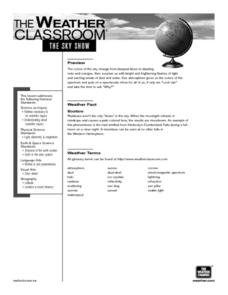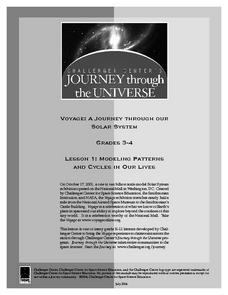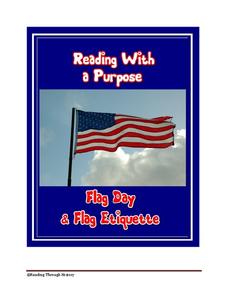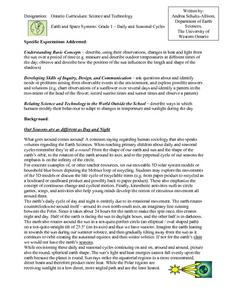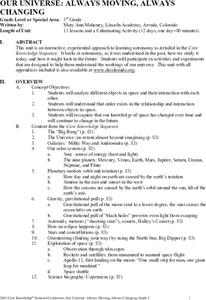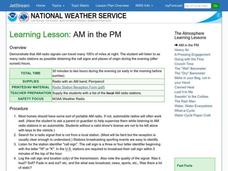Curated OER
What Goes Up Must Come Down!!
Fifth graders look at actual sunrise and sunset times for their hometown to determine a pattern in the amount of daylight. They collect their data in Excel and create a chart to help them identify the pattern, then write an explanation...
Curated OER
Sunrise, Sunset
What locations on Earth get the longest number of hours of daylight in the summer? Hint: It's not the equator! Use real-world sunrise and sunset data to develop trigonometric models that can be used to estimate the number of hours of...
Curated OER
Sunrise/Sunset
Third graders discovver what causes the dramatic colors of a sunset by seeing the changing color of light as it passes through a clear container of water to which milk is gradually added. They measure the liquids and observe what happens...
Curated OER
Sunrise-Sunset
Pupils gather data, make and share predictions about the time of sunrise ans sunset in their area. Patterns are analyzed and shared with students from other areas.
Curated OER
DASH Sunrise and Sunset/ Seasons Chart
Second graders rotate as the person to enter the information of sunrise and sunset into a spreadsheet. The teacher also demonstrates how to convert the spreadsheet into a chart.
Curated OER
Sunrise and Sunset
Students utilize a Mesonet daily solar radiation to determine the times of sunrise and sunset and the length of the day. They describe how sunrise and sunset change with latitude and longitude and how the length of the day changes with...
Curated OER
The Case of the Mysterious Red Light
Students investigate why some sunrises and sunsets are unusually bright red.
Curated OER
The Reasons for the Seasons
Sixth graders conduct a controlled investigation to determine the length of the sun's shadow on a fixed object (i.e., flagpole, telephone pole, etc.) over a three-day period (one day in the fall, one in the winter, and one in the...
Curated OER
Why is the Sky Blue?
Students explore diffusion or scattering of light. In this physics instructional activity, students explain why the sky is blue and sunsets/sunrises are red.
Curated OER
Stargazers and Skywatchers
Students observe the daily motions of the sun and relate them to the functions of a sundial. They determine the locations of sunrises and sunsets and determine how the elevation of the sun effects temperature.
Curated OER
Astronomy: Picture Time
Students investigate how to tell time by observing the placement of objects in the sky. Researching on the Internet, they locate the time for sunrise and sunset, the time the full moon rises, and the difference between clock and solar...
Curated OER
Sundials and Shadows - What Can They Teach Us About Seasons?
Students collect and analyze data relating to seasonal changes. They view a video, research web sites and build a sundial to collect their data.
Curated OER
Sky Show
Students participate in a discussion of the sky and colors. They watch a demonstration of how colors can change. They examine the issue of if weather should be a part of their coursework.
Curated OER
Exploring Seasonal Shadows and Sunlight
What can shadows tell us about the changing season? Over several months, astronomy learners record length and position of an outdoor object's shadow, such as a flagpole. They apply the data to a growing hypothesis and note the...
Curated OER
Modeling Patterns and Cycles in Our Lives
Students explore how building a model can help them better understand the natural world. They identify common cycles or patterns in nature as well as examples of models in the classroom. After discussion, they choose a pattern or cycle...
Reading Through History
Flag Day
Why is the United States flag such an important symbol to America that it gets its own day to celebrate it? Pupils read a passage that discusses the symbolism and significance of the American flag. Following the reading, they answer quiz...
Curated OER
The American Flag
Students examine the history and origin of the United States Flag. They identify each symbol and discover the proper way to display it. They discuss how the flag itself has played a part in recent events.
Curated OER
Science: Daily and Seasonal Cycles
First graders use their observations to describe daily and seasonal cycles. through a demonstration using a suspended ball and flashlight, they determine the time of day in various locations. Next, 1st graders participate in a...
Curated OER
Cloud Viewer
Fourth graders examine different types of clouds. In this cloud lesson, 4th graders examine pictures of different types of clouds and read details about them in the captions under the images. They make a cloud viewer by cutting out the...
Curated OER
Record the Data and Find the Averages
Students record the daily outdoor temperature as well as the number of minutes of sunlight per day over a determined period. They calculate the average temperature and minutes of sunlight per day and post their data on the project website.
Curated OER
Our Universe: Always Moving, Always Changing
Students explore the main concepts of astronomy through the eleven lessons of this unit. The past, present, and future methods of studying the science are examined in this unit.
Curated OER
Tell Time With Your Feet
Students discover what the latitude and longitude of their location is. They start walking and measure their shadow. They fill in a chart to discover the approximate time.
Curated OER
Learning Lesson: AM in the PM
Learners discover how AM radio signals can travel at night. They listen for a radio station not in their immediate area and log the call sign and the location of the station. They discuss the difference in transmissions during the night...
Other popular searches
- Sunrise Sunset
- Sunrise and Sunset
- Sunrise Sunset Times
- Sunrise, Sunset
- Chart Sunrise and Sunset
- Science Sunrise Sunset












